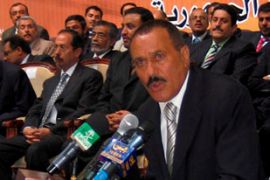North Yemen calm after truce
Army ceases military operations against Houthi fighters following ceasefire.

“We have decided to halt military operations in the northwestern region … to stop bloodshed, bring peace to the region,” the president’s office said in a statement.
International pressure
Hashem Ahelbarra, Al Jazeera’s correspondent in Sanaa, the Yemeni capital, said the breakthrough was also in part due to Western pressure on Saleh to tackle Yemen’s internal problems.
| in depth | |||||||||||||
|
“It’s a huge development – the opposition, the government, the Houthi seem all to agree this is a breakthrough, a turning point for Yemen,” he said.
“It came when Ali Abdullah Saleh was asked by the international community during the London conference [held last month] to come up with a swift, radical solution to Yemen’s pressing problems.
“I think he decided to start first with the war in Saada, to give him more leeway – a window of opportunity – to tackle Yemen’s most delicate problem, which is the secessionist movement in the south.”
Yemen said last week it had handed the fighters a timetable for implementing the ceasefire terms, a week after rejecting a Houthi truce offer because it did not include a promise to end hostilities with neighbouring Saudi Arabia.
The kingdom was drawn into the conflict in November when the group seized some Saudi territory, complaining that Riyadh was letting Yemeni troops use its land for attacks against them.
Riyadh declared victory last month after the Houthis offered a separate truce and said they had withdrawn from Saudi territory.
Truce conditions
Yemeni officials have said that as part of a truce deal, Sanaa would allow Houthi representatives to sit on a committee overseeing the truce, and the group’s fighters would hand over weapons they seized from Yemeni and Saudi forces.
| Six-point agreement | ||||||||||||
|
Yemen state television said the government and the group had also formed four smaller committees to supervise the truce in four areas, including on the Yemen-Saudi border.
The deadline for the full implementation of the truce had been a point of contention, with the Houthis asking for more time for their fighters to leave mountainous positions, they said.
Qatar brokered a short-lived ceasefire between the two sides in 2007 and a peace deal in 2008, but clashes soon broke out again.
Saleh, the Yemeni president, unilaterally declared the war over in July 2008, but full-scale fighting resumed a year later.
